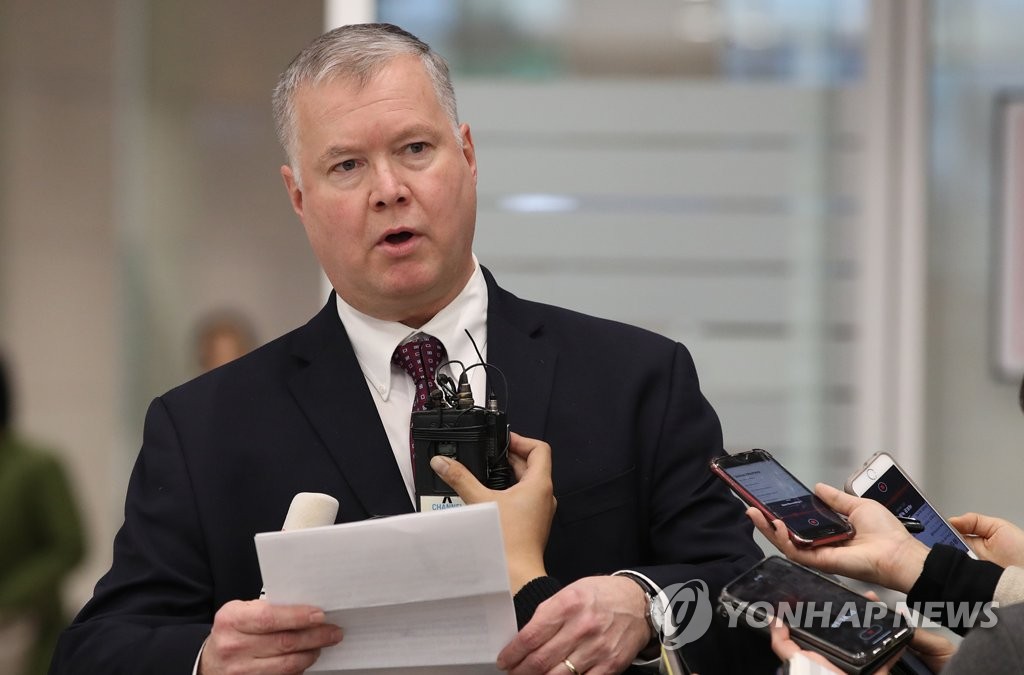- California Assembly OKs highest minimum wage in nation
- S. Korea unveils first graphic cigarette warnings
- US joins with South Korea, Japan in bid to deter North Korea
- LPGA golfer Chun In-gee finally back in action
- S. Korea won’t be top seed in final World Cup qualification round
- US men’s soccer misses 2nd straight Olympics
- US back on track in qualifying with 4-0 win over Guatemala
- High-intensity workout injuries spawn cottage industry
- CDC expands range of Zika mosquitoes into parts of Northeast
- Who knew? ‘The Walking Dead’ is helping families connect
U.S. to ‘reevaluate’ ban on American citizens’ travel to N.K. for humanitarian aid
SEOUL, Dec. 19 (Yonhap) — The United States will “reevaluate” its ban on American citizens’ travel to North Korea early next year to facilitate aid groups’ delivery of humanitarian assistance to the communist state, a U.S. nuclear envoy said Wednesday.
Stephen Biegun, the U.S. special representative on North Korea policy, made the remarks as Seoul is seeking to create fresh momentum in dialogue between Washington and Pyongyang amid a perceived lack of progress in their nuclear negotiations.
“We still prioritize the safety and security of Americans as we review the requests for travel, and we will continue to expect humanitarian aid organizations to be international standards for access in monitoring of their programs,” he told reporters upon arrival at Incheon International Airport, west of Seoul.
“However, we also believe conditions are right for us to reevaluate how these policies are implemented, and we plan to do so early next year,” he added.

Stephen Biegun, the U.S. special representative on North Korea policy, speaks while meeting with reporters upon his arrival at Incheon International Airport, west of Seoul, on Dec. 19, 2018. (Yonhap)
His prepared statement apparently signaled that the U.S. wants to keep its diplomacy with the North alive after it stepped up pressure on the reclusive state through sanctions and accusations of human rights violations.
Biegun said that Secretary of State Mike Pompeo has directed him to review Washington’s policy on humanitarian assistance to the North by private and religious U.S. aid groups.
He also noted that aid groups operating in the North are concerned that the strict enforcement of sanctions has “occasionally impeded the delivery of legitimate humanitarian assistance.”
“I will be sitting down with American aid groups early in the new year to discuss how we can better ensure the delivering of the appropriate assistance, particularly through the course of the coming winter,” he said.
“We will also review American citizens’ travel to the DPRK for the purpose of facilitating the delivery of aid and ensuring that monitoring in line with international standards can occur,” he added, referring to the acronym of the North’s official name, the Democratic People’s Republic of Korea.
Commenting on the North’s release in October of a U.S. citizen detained for illegal entry, Biegun pointed out that its expulsion decision has given Washington “greater confidence” about the safety and security of Americans traveling to the North.
“(The release) will be one factor we consider as we review the travel requests by American representatives of humanitarian aid groups,” he said.
During his four-day stay here, Biegun is likely to emphasize the importance of continued sanctions on Pyongyang despite inter-Korean cooperation.
He plans to meet bilaterally with South Korea’s top nuclear envoy, Lee Do-hoon, on Thursday. The next day, they will have a second “working group” meeting to be joined by officials from the White House and South Korea’s presidential office and unification ministry.
Announcing Biegun’s trip to Seoul, the State Department said it’s meant to strengthen coordination between the two sides on the “shared objective of the final, fully verified denuclearization.”
The two Koreas are preparing to hold a groundbreaking ceremony next week for their joint project to modernize and reconnect cross-border roads and railway tracks. It will be held at Panmun Station in the North’s border town of Kaesong on Wednesday.








![일본 사도광산 [서경덕 교수 제공. 재판매 및 DB 금지]](http://www.koreatimesus.com/wp-content/uploads/2024/07/PYH2024072610800050400_P4-copy-120x134.jpg)


